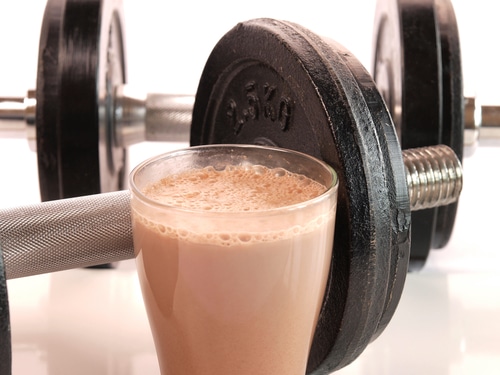
First, Do You Really Need a Protein Supplement?
Before spending your hard-earned money on an high priced protein supplement, make sure you really need it. A sedentary adult should get around 0.8 grams of protein per kilogram of body weight. The reality is most people get more than that. A kilogram is 2.2 pounds. So, a sedentary 150-pound adult needs around 55 grams of protein a day. That’s pretty easy to get through diet alone and most people get more than this without taking a supplement.
If you resistance train or do high-intensity exercise on a regular basis and are trying to increase your lean body mass, you may get better results if you consume 1.3 to 1.5 grams of protein per kilogram of body weight. This means a 150-pound person needs a maximum of 100 grams. That’s still not hard to get if you eat a diet that includes meat and dairy products.
If you’re not eating a vegetarian diet, getting enough calories and eating a diet of mostly whole, unprocessed foods, it’s not difficult to meet your protein requirements through diet alone. A 6-ounce organic chicken breast has 37 grams of protein, a single egg has 6 grams, and 6 ounces of wild-caught salmon has 35 protein grams. Six ounces of turkey breast has almost 50 grams of protein. With a 6 ounce serving of turkey, you’ve met half of your day’s protein needs if you’re an athlete. Even if you’re cutting back on meat, a cup of cottage cheese has 29 grams of protein. Combine that with two eggs (12 grams of protein) and you’ve met more than 40% of your day’s protein needs.
Vegetarians are a bit more challenged but tempeh, a fermented form of soy with a meat-like texture, has around 30 grams of protein per 6 ounce serving and a cup of cooked quinoa has 18 grams of protein. Vegetarians have to be careful to get protein from a variety of sources – whole grains, legumes, etc. to make sure they’re getting all the essential amino acids they need to build proteins. Soy is one of the few vegetarian protein sources that contain all of the essential amino acids. It’s best to get soy from sources like tempeh that are fermented. This reduces the number of anti-nutrients that can affect the absorption of some minerals and, possibly, negatively impact thyroid function.
Still Convinced You Need a Protein Supplement?
When you take a protein supplement, you may be absorbing only a fraction of what you’re taking in. One study showed that participants who consumed a 50-gram whey protein supplement only absorbed about 15 grams. Because protein supplements are so highly processed, it negatively impacts digestive enzymes and increases intestinal transit time so less is absorbed.
Your body seems to have a limited ability to absorb large amounts of protein at one time anyway. The maximum most people can absorb is about 30 grams during one meal. That’s why it’s important to space protein meals out over the day. This helps with satiety too.
Another Problem with Protein Supplements
When Consumer Reports tested protein supplements, some were contaminated with heavy metals like cadmium, lead, mercury, and arsenic. Three of the products had amounts that if used three times a day would expose you to higher levels of heavy metals that are deemed safe. That’s a sobering thought since cadmium causes kidney damage and is eliminated from your body at a very slow rate. If you absorbed cadmium today, it would take you 20 years to eliminate half of it.
Why Not Get Your Protein from Whole Food Sources?
A serving of wild-caught salmon has benefit you won’t get from sipping a protein drink. It’s a good source of heart-healthy omega-3s that are anti-inflammatory. Omega-3s are also important for brain function. A study showed that eating wild salmon twice a week lowers heart attack risk by 27%.
Eggs are a source of protein with the highest biological value. That means it’s in a form your body can easily absorb and use. When you consume whole eggs, you also get choline, a nutrient related to B vitamins, which has anti-inflammatory benefits and is important for brain health.
Better Ways to Get Your Protein
Most people down a protein drink for convenience, but there are other quick ways to meet your protein requirements:
- Eat a cup of cottage cheese.
- Eat a turkey sandwich on whole grain bread. (unprocessed turkey, of course)
- Eat a cup of Greek yogurt. A 6-ounce serving has between 15 and 20 grams of protein.
- Stock the fridge with tuna salad to scoop up when you’re in a hurry.
- Use natural almond butter and whole-grain crackers to make your nutcrackers.
- Spread Dijon mustard onto natural deli turkey, roll it up and eat it.
- Keep hard-boiled eggs, like Eggland’s Best Hard-Cooked Peeled Eggs, in the fridge for a quick, protein-rich snack.
The Bottom Line?
You’ll enjoy more nutritional benefits if you get your protein from whole foods sources rather than protein supplements. All of the protein you get from protein supplements isn’t absorbed because they’re so highly processed. Plus, you don’t know whether you’re taking in something you don’t want – heavy metals. Keep some protein snacks in the refrigerator to munch on throughout the day. They’ll probably taste better than a protein shake anyway.
References:
Journal of the International Society of Sports Nutrition 2008, 5:10.
Consumer Reports. “Protein Drinks”
Related Articles By Cathe:
What’s the Best Type of Protein for Boosting Muscle Protein Synthesis?
Will Protein Before Bedtime Help You Build More Muscle?
New Study Suggests More Protein is Better for Building Muscle
Can You Consume Too Much Protein?
4 Reasons Supplements Aren’t Always All They’re Cracked Up to Be
Can Consuming Protein after a Workout Help You Build More Muscle?

